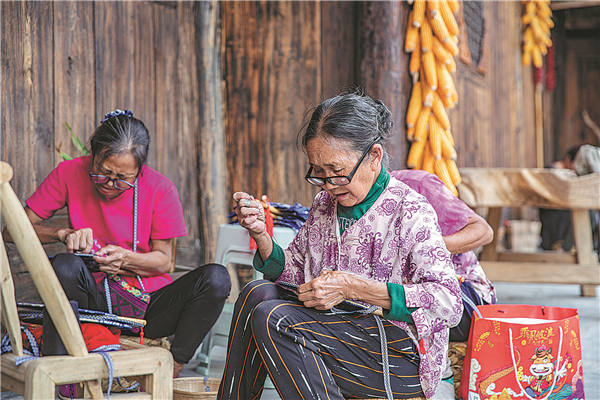

A group of grandmothers sit in front of a traditional-style dwelling in Southwest China, deftly sewing colored thread into a piece of blue cloth and occasionally bursting into peals of laughter.
Such is the scene in Hejiayan village, Youyang Tujia and Miao autonomous county, Chongqing, where elderly people from the Miao ethnic group are continuing their age-old cultural tradition of embroidery.
These women learned the craft as children, but they never expected that it would bring them together in old age, injecting some fun into their twilight years-not to mention an additional income stream.
This local resurgence of the craft started in 2013 when Chen Guotao, 48, opened her first Miao embroidery shop in Youyang. Having been raised in a rural area, Chen was keen to help fuel China's rural revitalization, and in 2016, she set up the first of several embroidery workshops. They offered job opportunities for unemployed female villagers who had stayed behind to care for the family while relatives sought higher salaries elsewhere.
Chen now has four Miao embroidery workshops, three in villages and one in the county seat, employing more than 1,000 locals.
But the workshops are more than just workplaces. They are also social clubs for local senior citizens, most of whom would lead rather dull lives otherwise, sitting at home with little social interaction.
Ran Guoxian, 76, lives halfway up the hill. With the aid of a stick, she walks up the mountain to the workshop in Hejiayan village every day. She is allowed to do her embroidery at home, but she prefers to get out of the house.
"The workshop fills my life with happiness. I finally have something to do and have someone to talk to," says Ran.
Previously, she spent her days at home, killing time, often just sitting in the yard and looking up at the sky.
The Hejiayan workshop alone has more than 100 workers, about 80 percent of whom are elderly. Basking in the warm sunshine and enjoying the tranquility of their embroidery, these senior citizens are now an established feature in the village.
Chen is glad to see their positive change in attitudes toward life. She always leaves the lightest jobs for the older workers, but she pays a relatively high price for their work. She also provides a medical kit in case they feel uncomfortable during their work.
It is not just elderly women who benefit from these special embroidery workshops. There are also quite a few middle-aged women among them.
Hu Lan, 55, works at the Miao embroidery workshop in Hejiayan village, and has become her family's main bread winner. Previously, she stayed at home, looking after her sick husband without any paid work of her own.
"When I didn't have any income, I used to worry a lot and feel I was a burden to my children, but since I began to make money through embroidery, I feel more at ease," says Hu.
She says she can earn around 1,500 yuan ($223) a month, which helps lighten the family's financial load.
"It's more than just business. I, myself, was born in a village and I know too well the difficulties they face. So I'd like to make a difference for them," says Chen.
Thanks to Chen's efforts, the county's ethnic embroidery craft has gained popularity both at home and abroad through the brand name Youzhou Miao Embroidery.
It has been recognized at the municipal level as a form of intangible cultural heritage, and has become the gift of preference offered to foreign visitors by Chongqing's foreign affairs office.
With delicate designs and rich cultural connotations, Youzhou Miao embroidery is a local cultural product with a high added value. Last year, Chen's workshops produced 95,600 pieces of embroidery, with a total value of 7.62 million yuan, giving the local rural economy a significant boost.